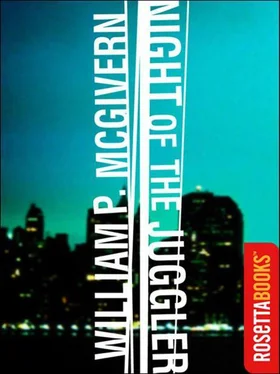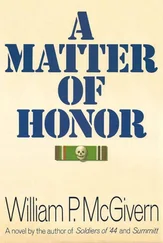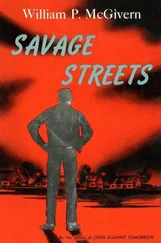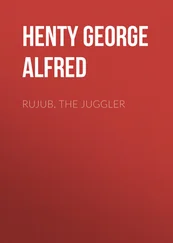William McGivern - Night of the Juggler
Здесь есть возможность читать онлайн «William McGivern - Night of the Juggler» весь текст электронной книги совершенно бесплатно (целиком полную версию без сокращений). В некоторых случаях можно слушать аудио, скачать через торрент в формате fb2 и присутствует краткое содержание. Жанр: Триллер, на английском языке. Описание произведения, (предисловие) а так же отзывы посетителей доступны на портале библиотеки ЛибКат.
- Название:Night of the Juggler
- Автор:
- Жанр:
- Год:неизвестен
- ISBN:нет данных
- Рейтинг книги:3 / 5. Голосов: 1
-
Избранное:Добавить в избранное
- Отзывы:
-
Ваша оценка:
- 60
- 1
- 2
- 3
- 4
- 5
Night of the Juggler: краткое содержание, описание и аннотация
Предлагаем к чтению аннотацию, описание, краткое содержание или предисловие (зависит от того, что написал сам автор книги «Night of the Juggler»). Если вы не нашли необходимую информацию о книге — напишите в комментариях, мы постараемся отыскать её.
Night of the Juggler — читать онлайн бесплатно полную книгу (весь текст) целиком
Ниже представлен текст книги, разбитый по страницам. Система сохранения места последней прочитанной страницы, позволяет с удобством читать онлайн бесплатно книгу «Night of the Juggler», без необходимости каждый раз заново искать на чём Вы остановились. Поставьте закладку, и сможете в любой момент перейти на страницу, на которой закончили чтение.
Интервал:
Закладка:
There was no signature. Luther Boyd stood uncertainly for a moment or so in the dimly lighted living room, tossing the slender cartridge up and down gently in the palm of his hand. At last he came to a decision which gave him very little pleasure. He sighed and walked back to the den, where a tape recorder rested on his desk alongside a neat stack of unanswered correspondence.
Luther Boyd made himself a mild scotch with soda and packed a pipe from a soft leather tobacco pouch. Then he set the tape in its spool, snapped the switch, and watched it begin to spin, his expression hard and thoughtful.
Chapter 2
The New York police department was not unaware of Gus Soltik. Nor was it unaware of the “lessons” which he had administered to four young girls on four successive years, precisely in the middle of the month of October.
Four in a row, Lieutenant Vincent “Gypsy” Tonnelli was thinking, and this is October, and tomorrow is the fifteenth, and would they nail the psycho bastard then, or would the Juggler make it five in a row?. .
They didn’t know Gus Soltik’s name, and they had only a vague description of him, but they knew certain areas of his MO very well indeed.
The murderer who in the past four years had abducted, mutilated, raped, and then slashed the throats of four young girls in the borough of Manhattan was known to the police as the Juggler because that was the final dreadful gesture in his pattern, a knife ripped across tender jugular veins.
These thoughts were in Lieutenant Tonnelli’s mind as he strode along the corridor of a precinct in the upper Sixties of Manhattan.
This was headquarters of the task force which had been assigned to Lieutenant Tonnelli two months earlier by Assistant Chief of Detectives Walter Greene, a graying veteran with a rasping voice and a head shaped like an artillery projectile. Tonnelli’s second unit was stationed at the 13th Precinct on the East Side and was under the command of Detective Sergeant Michael “Rusty” Boyle.
In each unit of Lieutenant Tonnelli’s task force were two switchboard operators and four detectives, second grade. At headquarters, which was located in the 19th Precinct on East Sixty-seventh Street, were Detectives Clem Scott, Jim Taylor, August Brohan, and Carmine Garbalotto. On the switchboards were Patrolmen Jules Mackay and August Sokolsky. Collating and indexing the steadily mounting piles of paperwork were two uniformed policewomen, Doris Polk and Rachel Skinner.
In Detective Sergeant Rusty Boyle’s command in the 13th Precinct on East Twenty-first Street were Detectives Miles Tebbet, Jason Corbell, Roger Fee, and Ray Karp. On the switchboard were Patrolmen Joe Knapp and Ed Maurer, and the flow of files and reports was in the competent hands of Patrolwomen Alice Halzer and Melissa Foreberg.
Lieutenant Gypsy Tonnelli was short and stocky, with a huge chest and heavily muscled arms so thick that he couldn’t wear jackets or sports coats from a rack, but had to have them fashioned by a tailor.
Since he was forced to spend considerable money on his clothes, he had over the years cultivated a certain sartorial elegance; in fact, the lieutenant looked like a prosperous broker with a subdued but excellent sense of fashion rather than a very tough and, in this particular city, a nearly legendary cop.
A bachelor, Lieutenant Tonnelli lived in a modest apartment in the East Thirties and indulged himself in very few extravagances beyond his taste for well-made clothing. His father and mother were dead, and his only living relative was his sister, Adela, who was married to a Greek used-car dealer in Baltimore. She had some kids, he knew, but they didn’t see each other anymore, didn’t even exchange Christmas cards.
Gypsy Tonnelli’s features were usually composed in a deceptively pleasant smile. His eyes were dark brown, and his lips were full and red. A scar coursed from his left temple to the point of his jaw, a vivid cicatrice which he had acquired while subduing a carload of unruly blacks during one of the riots in the late sixties. Lieutenant Tonnelli had once been so ashamed of the scar that he had grown a beard to conceal it. But to his consternation the beard, unlike his coal-black hair, had emerged in an embarrassing pepper-and-salt mixture.
Preferring the scar to a prematurely graying beard, Tonnelli had shaved off the stubble and later had become quite proud of the villainous-looking crease that ran down the left side of his face, for it had become a cherished memento of the citation he had received, a benchmark on the legend that was Gypsy Tonnelli.
And why “Gypsy”? The nickname had been hung on him when he was still in uniform and stemmed from the fact that he was a Sicilian, hence was nurtured by a tradition that believed in evil eyes, believed that good and bad luck could be divined by cloud masses and falling stars, and believed that dogs howling in the night were often predicting their masters’ deaths and that silver bullets and strings of garlic were specifics against vampires and werewolves.
In a word, the Gypsy was superstitious, but he did possess an uncanny ability for predicting the variety of crimes lurking in store for his city, which he knew as a wise old mother knows her children.
Some mysterious sixth sense could warn him that in the weeks ahead they could expect a rise in arson and a decline in murders, a dip in muggings, a surge of bank robbers.
At first, his superior officers didn’t take the Gypsy’s predictions all that seriously, but they couldn’t explain his high percentage of accurate guesses by luck or coincidence. The Gypsy was dead right so often that at last everyone on the force began to respect his Sicilian intuitions.
However, despite the Gypsy’s track record, he hadn’t been able to convince his superiors that more than coincidence was involved in the murders of Encarna Garcia and Bonnie Jean Howell, whose bodies had been tortured and violated and whose throats had been slashed on successive years under the sign of Libra on the nights of October 15.
The following year, again on Libra 15, Trixie Atkins had been murdered after suffering the same sadistic refinements that had been inflicted on the bodies of Encarna Garcia and Bonnie Jean Howell.
Gypsy Tonnelli, in the next year, starting on October 1, had prowled the streets of Manhattan on his off-hours, praying that by luck or coincidence he might get his hands on the Juggler. And after Trixie Atkins’ murder he had demanded and been reluctantly granted a meeting with Deputy Chief of Detectives Walter Greene in the chief’s office at 24 °Centre Street.
What Tonnelli wanted was a task force of experienced detectives to prepare a defense against what he was convinced would be a fourth ritual murder in the coming year.
The chief had said, “Sure, there’s going to be a homicide next October 15. Probably a half dozen or more. We had forty-one a couple years back during that hot spell in July and August. I hear you been putting in overtime without pay on this job, Gypsy. Right?”
Tonnelli wasn’t surprised at the chief’s on-the-mark question; the word of any erratic conduct by a cop (particularly one with Tonnelli’s rank) would inevitably spread through all echelons of the department.
“I worked my shift, Chief,” Tonnelli said with the trace of an edge to his voice. “Then I hit the streets on my own time. Just hoping to get lucky.”
The chief had sighed and stared with a certain weary irritation at the ceiling of his office. “Gypsy, I don’t like my cops running around off duty with this Dick Tracy hero bullshit. You want to moonlight, fine. Do something useful. Drive a hack, or ride shotgun for a numbers runner. Being realistic, Gypsy, the people who pay our salaries, the public, they don’t like dedicated cops either.” The chief’s voice had been threaded with sarcasm. “They think a cop putting in extra time on his own is just looking for a chance to whip some more heads. When my cops are off duty, I want them at ball games or at the beach with their kids so they can come back to the precinct feeling a little bit human.”
Читать дальшеИнтервал:
Закладка:
Похожие книги на «Night of the Juggler»
Представляем Вашему вниманию похожие книги на «Night of the Juggler» списком для выбора. Мы отобрали схожую по названию и смыслу литературу в надежде предоставить читателям больше вариантов отыскать новые, интересные, ещё непрочитанные произведения.
Обсуждение, отзывы о книге «Night of the Juggler» и просто собственные мнения читателей. Оставьте ваши комментарии, напишите, что Вы думаете о произведении, его смысле или главных героях. Укажите что конкретно понравилось, а что нет, и почему Вы так считаете.












